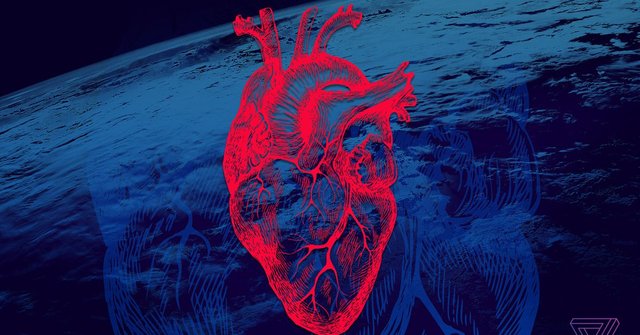Just like love, space can be hard on the heart
Ah, Valentine’s Day — a holiday that can certainly take its toll on the human heart. But there’s some small solace for those whose hearts are aching instead of humming today: at least you’re not in space.
Just like love, space isn’t very kind to the heart. In fact, the organ actually changes shape after being in microgravity for a long time. On Earth, the heart hangs in the chest and takes on a somewhat oblong shape because it’s constantly pulled down by gravity. But in space, that gravity is effectively gone — and the heart adjusts. “It no longer hangs there, and the heart becomes more spherical in nature,” Michael Bungo, a cardiologist at the University of Texas Medical School who has studied the effects of spaceflight on the heart, tells The Verge.
Just like love, space isn’t very kind to the heart
The heart may also change shape in space because it doesn’t have to toil as hard. On Earth, the heart is constantly working against gravity to pump blood up from the legs all the way to the head. Without gravity, the heart doesn’t have to do as much work to get the blood where it needs to go. And as a result, the heart can lose critical muscle mass. “If you don’t exercise sufficiently — and do cardiovascular exercise in particular — you will actually start to have a de-conditioning of the heart,” Dorit Donoviel, the director of the Translational Research Institute for Space Health at Baylor College of Medicine, tells The Verge. “So it will not be able to pump blood as well when you return back to Earth.”
Complicating matters is the fact that astronauts in space actually lose blood volume, too — so the heart has less fluid to pump. That’s a side effect of microgravity, which causes fluids to shift in the body. Blood tends to collect more toward the lower extremities on Earth, since people spend most of their lives upright; the blood pressure in your veins is going to be higher in your feet than in your hips, for instance. Well in space, a lot of the blood that normally sits in the legs gets redistributed to the heart, and the body, once again, adjusts. “The body says, ‘Well gosh I’ve got all that extra blood near the heart. I must have too much,’” Bungo says. “So over the first few days in space, the body gets rid of that extra blood volume” by getting rid of bodily fluids.
In other words, the astronauts have to pee a lot, especially when they first get to space. It’s a similar explanation for why you have to pee when you first wake up each day. But in space, this loss of fluid causes astronauts to have about 15 percent less blood volume than they would have on Earth, says Bungo.
Less blood means the heart, once again, gets some slack. And that can be a problem for astronauts when they return to Earth. When thrust back into gravity, a person’s blood will rush to his or her feet. But low blood volume means there’s less blood to return to the upper part of the body — plus the heart is probably not as capable of pumping that blood. So astronauts run the risk of fainting when they get back to Earth, since they don’t have adequate blood flow right away to the head.
the good news is most of these changes are temporary
Fortunately, astronauts have strategies to combat these problems. Crews will often load up on fluids before they return to Earth to increase their blood volume and avoid fainting. Astronauts also have a strict daily exercise regimen to keep their hearts strong and healthy. And the good news is most of these changes are temporary: the cardiovascular system usually goes back to normal on Earth.
Still, it goes to show that space can have a big impact on the human heart — just like love. So if you really want to put your heart to the test this Valentine’s Day, you can try plunging yourself into that all-encompassing black void that is trying to crush you at every moment. Or you can go to space!